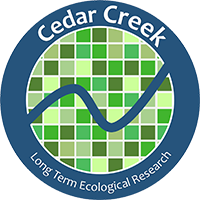Interns play a key role in Cedar Creek's long-term ecological research projects. An LTER internship at Cedar Creek is a great way to immerse yourself in the world of field research! You will be able to work outside in prairies, savannas, forested areas, and other landscapes, gain experience with a variety of scientific methods and techniques, and contribute to LTER research at one of the world’s foremost field stations. Through the independent research experience, Cedar Creek LTER offers interns a unique opportunity to experience the entire research process from start to finish!
For more information and to apply for a Cedar Creek LTER internship, CLICK HERE.
Independent Research Experience for LTER Interns
As part of the intern summer research experience, all interns have the opportunity to develop and
conduct their own independent research project. This independent research is not mandatory but highly
encouraged. A portion of this experience is paid, but most of the independent project is conducted
outside of work hours. Interns can earn credit for this experience if approved by their home institution.
Cedar Creek provides a full-service program with mentors that will guide interns on how to plan,
execute, and present their project, through both workshops and one-on-one mentoring. The workshops
include topics such as reverse planning to develop a proposal, data analysis, and how to make and
deliver an effective presentation. For examples of past projects, please see the list below.
- assessing effects of roadside nutrients and toxins on milkweed and pollinators;
- surveying oak wilt across the savannas;
- determining how decomposition depends on ectomycorrhizal fungi and necromass quality;
- analyzing existing data from a long-term experiment to determine plant diversity responses to warming, fertilization, and drought;
- investigating denitrification rates in the water column of Cedar Bog Lake;
- developing a new education activity for a middle school student field trip to a research experiment; and
- using trail cameras to monitor the timing of small mammel movements and behaviors.

Research symposium and field tour
We begin the summer with a day that highlights Cedar Creek’s experiments and researchers. Interns attend a symposium to learn about a wide range of active research projects at Cedar Creek. Researchers are asked to highlight areas where undergraduate students might connect with ongoing projects. In addition to the indoor research symposium, interns also participate in field tours offered by Cedar Creek’s faculty, postdoc, and graduate student researchers. This provides opportunities for interns to meet Cedar Creek researchers in an informal setting.

Weekly Seminars and Workshops
Throughout the summer, we provide a weekly series of research seminars and workshops. Seminars provide greater depth and context for a wide range of research projects at Cedar Creek and beyond. Workshops provide formal research training on a variety of topics, including developing a research proposal, analyzing data, and making and delivering an effective research presentation.

Graduate school and environmental career panels
During the summer, we also convene panels of graduate students and professionals from a wide range of environmental careers. Graduate students share about their experiences in graduate school, including offering guidance on identifying an advisor and navigating the application procress. Environmental career panelists share about the various pathways that led them to their current careers and their experiences working for various agencies, private conservation organizations, and academic institutions. Interns are encouraged to use these panels to ask questions and begin thinking about future career options.

Intern research symposium
We end the summer with a second research symposium in which interns share the results of their independent research projects. Many interns choose to continue working on projects after the summer season. Interns who wish to publish their results can apply for funds to cover the costs of publication fees. Interns who wish to present their results at professional conferences, such as the Ecological Society of America's Annual Meeting, can apply for travel funds.
A day in the life of a Cedar Creek Intern
Here is a typical work day for the interns at Cedar Creek:
The interns meet every morning with their supervisor in order to discuss the tasks for the day. They get information on what they are doing and receive training on any scientific methods that they will be utilizing for the day. In the field, interns work in small or large groups to complete their daily tasks. These tasks include such things as percent cover measurements, fertilizer applications, harvesting biomass, taking light measurements, measuring soil moisture, and taking soil samples.
Interns return to the main campus area for lunch and either eat together or attend a lunchtime seminar. After lunch, interns meet with their supervisor again to discuss changes from the morning plans and to ask questions about what they have been doing. They continue their work in the field for the afternoon.
At the end of the day, interns spend their time off relaxing, working on their independent projects, attending a workshop, having potluck dinners together, and sitting by the campfire!

